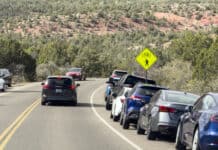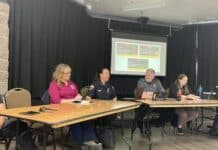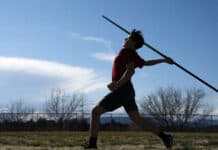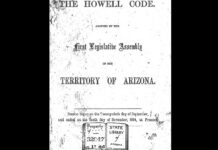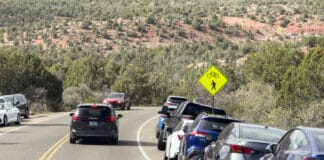
This is the last part of a four-part series on the recent meeting of the Yavapai Cattle Growers’ Association.
The Yavapai County Board of Supervisors discussed what members said were negative effects of OHVs on rangeland in the Prescott and Coconino National Forests during the final part of the Yavapai Cattle Growers Association meeting held at the Yavapai County Administration Building in Cottonwood on Thursday, Sept. 7.
“It’s been about two and a half years where we’ve developed language to have the legislature take a look at regarding the OHV violations that are occurring at a rampant rate in our state,” said Yavapai County District 3 Supervisor Donna Michaels [D]. “Some of you might say, ‘What does that have to do with ranching?’ What we are here to tell you, as supervisors, is it is everything, it’s inextricably intertwined. Our ranch lands are being decimated by OHV abuse and that impacts grazing allotments, and whether it’s a drought or not, we support ranchers having the most grazing allotment that is practical [and] permissible … This is fundamental to who we are in this state.
“Whether it’s an OHV, a water issue, or wildfire issue this board stands ready to do what it takes to support our ranching. Because if ranching doesn’t happen, ladies and gentlemen, nothing else does. I so appreciate this industry, and I’m proud to be a card-carrying member of the Yavapai and Arizona Cattle Growers Association.”
Ranchers Becki and Dustin Ross gave a presentation on 347 locations between Sedona and Cottonwood, on public U.S. Forest Service land that they use as rangeland for their cattle, that they said have been damaged by OHV use. The monitoring is part of a project they have been working on for eight years following a suggestion from the meeting moderator, Andy Groseta, a former YCGA president.
“There’s a lot of [damage],” Becki Ross said. “The roads and the range [have] been impacted by the misuse of OHV operators and with the budget cuts of the Forest Service’s maintenance, and law enforcement, they just can’t keep up with the rapid increase in volume that we’ve seen over the last 10 years.”
“I hear from people all the time that ‘I don’t go out there anymore because I never see deer.’ So why would you hunt out there? Or if I take friends to hike Doe Mountain, all you see is a big trail of dust, or all you hear is noise all the time … and I hear that about Bear Mountain as well,” Ross added. Ross also said that she views increased OHV enforcement as a major need on rangelands, a view shared by most in attendance.
How that would come about is unclear, considering that the two Congressmen in attendance, U.S. Rep. Paul Gosar [R-District 9] and U.S. Rep. Eli Crane [R-District 2], expressed austerity-based views on federal staffing levels and local law enforcement reimbursement ahead of the budget discussions for next fiscal year.
“The problem is the Forest [Service] doesn’t have enforcement capabilities, neither does Game and Fish, and the speed limits on those roads, they may not even be posted, but they’re certainly not adhered to,” Yavapai County Sierra Club Chairman Gary Beverly said. “[Yavapai County District 4] Supervisor Craig Brown [R] told me last legislative session, they were trying to get a bill through the legislature to lower the speed limits on those kinds of roads.”
“My experience has been the ranchers aren’t thrilled with the off-highway vehicle crowd, and that’s often been a tool I’ve used to communicate with them in trying to build a working relationship,” Beverly said. “Some of the residents are being hammered by noise, high-speed OHVs that are rented by rental companies in Sedona. They’re going very fast, making huge clouds of dust, and it’s actually killed the piñonjuniper trees lining the roadside on Dry Creek Road.”
“I don’t think we’re looking at a lot of new regulations against OHVs or anything of that nature,” Yavapai County District 1 Supervisor Harry Oberg said at the meeting. “I think what we are looking at is what Supervisor Michaels and I have talked about is the three E’s.”
Oberg said that the “three E’s” were “education, enforcement and environment” and called for increased enforcement of OHVs on public lands in Yavapai County, saying that such an effort needs to be supported but that “I don’t know” if that means the state of Arizona or Yavapai County government providing the material support.
“The last thing, of course, is trying to do something environmentally, trying to clean up some of the mess that we see when you go down around my area around Castle Hot Springs, you look at all the hills, you can see where people are going up on the hills, straight up,” Oberg said. “Of course, the first time you have rain, that starts creating ruts, and then you got almost a gully there. There’s a lot that we can do to try and support, maybe recovering some of our ground to where it’s not impacted anymore.”
Other Lawmakers
“The videos that [Ross was] showing at that meeting were very compelling,” Arizona State Sen. Ken Bennett [R-District 1] said at a Mingus Mountain Republican Club meeting on Sept. 12. “I think there’s a role to look at some legislation to make sure that those kinds of activities aren’t happening on rancher’s lands and destroying the environment. That’s very much something that I think will be part of the next session.”
Bennett did not say what such legislation might look like.
Bennett and the two Arizona District 1 representatives, Rep. Quang H. Nguyen [R] and Rep. Selina Bliss [R] did send a letter warning the city of Sedona about the possible illegality of a proposed municipal ordinance to regulate OHVs in city limits.
“We need to figure out a way to balance the use and to encourage less environmentally damaging uses,” Sedona City Councilman Pete Furman said. “I can’t imagine the impact on the ranchers that are out there. … I’ve talked to some of the rancher folks and it just has to be super impactful on their business and their quality of life as well.”
Two items Furman wants the state legislature to look at is regulating the speed of OHVs on dirt roads and the volume of use.


